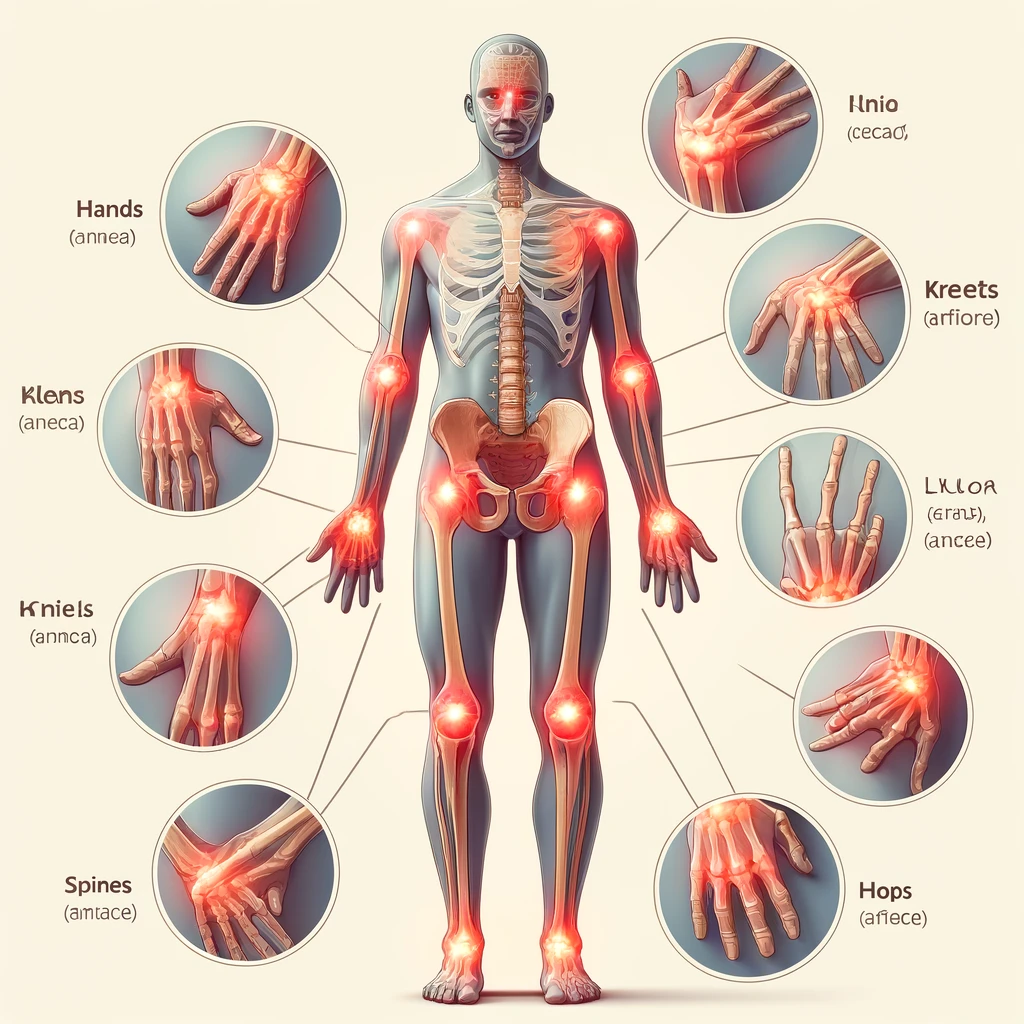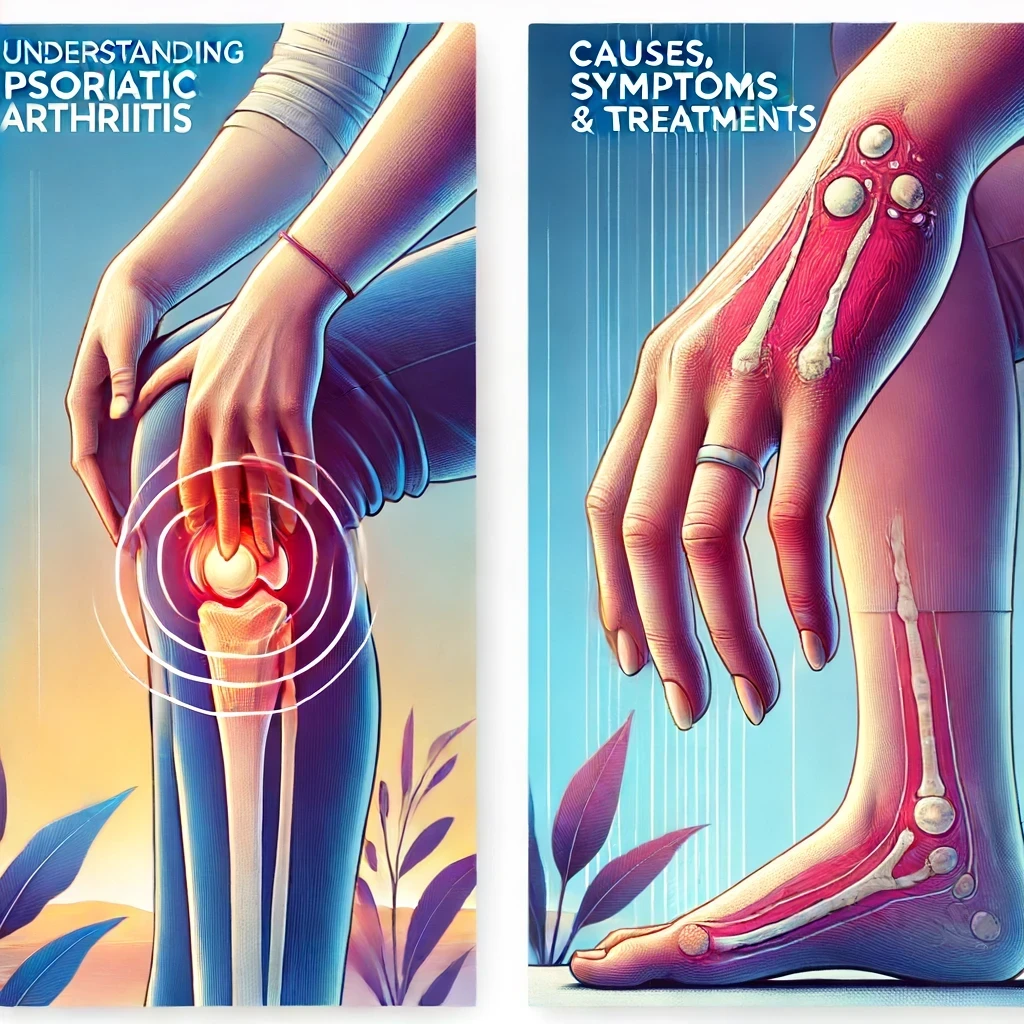
Table of Contents
Arthritis is a condition that affects millions of people around the world. It encompasses more than 100 different types of joint diseases, each with its own set of symptoms and challenges. This comprehensive guide aims to provide you with a thorough understanding of arthritis, covering everything from its symptoms and causes to the latest treatments and lifestyle changes that can help manage the condition effectively.
What is Arthritis?
Definition and Overview
Arthritis is a broad term that refers to inflammation of the joints. It can affect one or multiple joints, leading to pain, swelling, and stiffness. There are over 100 types of arthritis, with osteoarthritis and rheumatoid arthritis being the most common.
Common Symptoms of Arthritis
Pain and Swelling
Joint pain and swelling are the hallmark symptoms of arthritis. The pain can range from mild to severe and may be constant or intermittent.
Stiffness and Reduced Mobility
Many people with arthritis experience stiffness, especially in the morning or after periods of inactivity. This can lead to reduced mobility and difficulty performing everyday tasks.
Fatigue and General Discomfort
Fatigue is a common symptom, particularly in rheumatoid arthritis. This, combined with pain and stiffness, can significantly impact a person’s quality of life.
Types of Arthritis
Osteoarthritis
Causes and Risk Factors
Osteoarthritis is caused by the breakdown of cartilage, the protective tissue at the ends of bones. Risk factors include aging, obesity, joint injuries, and genetics.
Symptoms and Progression
Symptoms include joint pain, tenderness, stiffness and loss of flexibility. The condition typically worsens over time.
Treatment Options
Treatments include pain relief medications, physical therapy, and in severe cases, joint replacement surgery.
Rheumatoid Arthritis
Causes and Risk Factors
Rheumatoid arthritis is an autoimmune disease where the immune system attacks the joints. Risk factors include genetics, smoking, and gender, with women being more commonly affected.
Symptoms and Progression
Symptoms include swollen, tender joints, fatigue and fever. Rheumatoid arthritis can lead to joint deformities over time.
Treatment Options
Treatment focuses on controlling inflammation and slowing disease progression with medications such as DMARDs and biologics, along with physical therapy.
Psoriatic Arthritis
Causes and Risk Factors
Psoriatic arthritis affects some people who have psoriasis, a skin condition. Risk factors include having psoriasis and a family history of the disease.
Symptoms and Progression
Symptoms include joint pain, stiffness, and swelling, as well as skin lesions. It can affect any part of the body, including the fingertips and spine.
Treatment Options
Treatments include NSAIDs, DMARDs, biologics, and lifestyle changes to manage symptoms.
Gout
Causes and Risk Factors
Gout is caused by the buildup of urate crystals in the joint, often affecting the big toe. Risk factors include diet, obesity, and certain medical conditions.
Symptoms and Progression
Symptoms include sudden, severe attacks of pain, redness, and tenderness in the joints.
Treatment Options
Treatment involves medications to reduce inflammation and uric acid levels, as well as dietary changes to prevent future attacks.
Juvenile Arthritis
Causes and Risk Factors
Juvenile arthritis is a term used to describe arthritis in children. The exact cause is unknown, but it is thought to involve genetic and environmental factors.
Symptoms and Progression
Symptoms include joint pain, swelling, and stiffness, as well as potential eye inflammation and growth problems.
Treatment Options
Treatment focuses on relieving pain, reducing inflammation, and improving function through medications and physical therapy.
Causes and Risk Factors
Genetic Factors
Genetics can play a significant role in the development of arthritis. Certain types, like rheumatoid arthritis and ankylosing spondylitis, have strong genetic links.
Lifestyle Factors
Diet and Nutrition
A diet high in sugar, processed foods, and red meat can increase inflammation and exacerbate arthritis symptoms.
Physical Activity
Regular physical activity can help maintain joint function and reduce pain and stiffness.
Environmental Factors
Exposure to certain environmental factors, such as smoking or pollutants, can increase the risk of developing arthritis.
Autoimmune Responses
In autoimmune types of arthritis, like rheumatoid arthritis and lupus, the immune system mistakenly attacks healthy tissue.
Diagnosing Arthritis
Medical History and Physical Examination
A detailed medical history and physical examination are essential for diagnosing arthritis. Your doctor will ask about your symptoms, family history, and conduct a physical examination of the affected joints.
Diagnostic Tests
Blood Tests
Blood tests can help diagnose certain types of arthritis, such as rheumatoid arthritis and gout, by checking for specific markers like rheumatoid factor and uric acid levels.
Imaging Tests (X-rays, MRI, Ultrasound)
Imaging tests are used to get a detailed view of the joints and can help identify the extent of damage and inflammation.
Conventional Treatments for Arthritis
Medications
Pain Relievers and Anti-Inflammatories
Over-the-counter medications like NSAIDs (e.g., ibuprofen) can help reduce pain and inflammation.
Disease-Modifying Antirheumatic Drugs (DMARDs)
DMARDs are used to slow the progression of rheumatoid arthritis and other inflammatory types of arthritis.
Biologic Response Modifiers
Biologics target specific components of the immune system to reduce inflammation and prevent joint damage.
Physical Therapy
Physical therapy involves exercises and treatments designed to improve joint function and reduce pain.
Surgical Options
Joint Replacement Surgery
In severe cases, joint replacement surgery can be performed to replace damaged joints with artificial ones.
Arthroscopy
Arthroscopy is a minimally invasive surgical procedure used to diagnose and treat joint problems.
Natural Remedies and Alternative Treatments
Herbal Supplements
Turmeric
Turmeric contains curcumin, which has anti-inflammatory properties that can help reduce arthritis symptoms.
Ginger
Ginger has anti-inflammatory and pain-relieving properties that may benefit people with arthritis.
Dietary Changes
Anti-Inflammatory Diet
An anti-inflammatory diet includes foods rich in antioxidants and omega-3 fatty acids, such as fruits, vegetables, nuts, and fish.
Physical Activities and Exercises
Yoga
Yoga can help improve flexibility, strength, and balance, reducing arthritis symptoms.
Tai Chi
Tai Chi is a gentle exercise that can improve joint function and reduce pain.
Mind-Body Techniques
Meditation
Meditation can help manage pain and stress, which are common in people with arthritis.
Acupuncture
Acupuncture involves inserting thin needles into specific points on the body to relieve pain.
Lifestyle Changes to Manage Arthritis
Weight Management
Maintaining a healthy weight can reduce stress on the joints and alleviate arthritis symptoms.
Stress Reduction Techniques
Stress can worsen arthritis symptoms. Techniques like deep breathing, meditation, and progressive muscle relaxation can help.
Ergonomic Adjustments
Making ergonomic adjustments at home and work can reduce joint strain and improve comfort.
Regular Physical Activity
Regular exercise can help maintain joint function and reduce pain.
Living with Arthritis
Coping Strategies
Pain Management Techniques
Pain management techniques include medications, physical therapy, and alternative therapies like acupuncture.
Maintaining Mobility and Function
Staying active and participating in physical therapy can help maintain mobility and function.
Support Systems and Resources
Support Groups
Joining a support group can provide emotional support and practical advice from others living with arthritis.
Educational Resources
Educational resources can provide valuable information about managing arthritis and staying informed about new treatments.
Recent Advances in Arthritis Research
Innovative Treatments
Recent advances in arthritis research have led to the development of new medications and treatments that target specific pathways involved in the disease.
Promising Research Studies
Ongoing research studies are exploring new ways to prevent, diagnose and treat arthritis, offering hope for better management and potential cures in the future.
Conclusion
Arthritis is a complex and often debilitating condition, but with the right knowledge and strategies, it can be managed effectively. By understanding the symptoms, causes, and treatments and making necessary lifestyle changes, you can improve your quality of life and live well with arthritis.
FAQs
Q1: What are the most common symptoms of arthritis?
Common symptoms include joint pain, swelling, stiffness and reduced mobility.
Q2: Can diet and exercise help manage arthritis?
Yes, a healthy diet and regular exercise can help reduce inflammation and improve joint function.
Q3: What are the risk factors for developing arthritis?
Risk factors include genetics, age, obesity, joint injuries and certain environmental factors.
Q4: Are there natural remedies for arthritis?
Yes, natural remedies like turmeric, ginger and an anti-inflammatory diet can help manage symptoms.
Q5: What are the latest advances in arthritis treatment?
Recent advances include new biologic medications and research into regenerative therapies.


